 On
June 30, 1960, King Baudouin I of Belgium granted independence
to the Congo (Zaïre from 1971), and Patrice Lumumba was
named Prime Minister. Two months later Lumumba was out of
power. Western news accounts identify Lumumba as a reckless
pro-Soviet leader, but the truth has a way of coming out.
Ten years in the making, director Raoul Peck has now brought
new facts to light in the powerful biopic Lumumba.
The film focuses on how Lumumba (played by Eriq Ebouaney)
gave up a job in one of the provinces to sell beer in Leopoldville
(now Kinshasa), the capital of the Belgian Congo, while agitating
for independence. For his efforts, colonial authorities imprison
him, where he is brutalized until independence talks are convened
in Brussels. Much of the story then focuses on the duplicity
of Belgian authorities, who wanted to quit the country due
to independence agitation but maintain control of the military
force and the mineral-rich Katanga province. (There is even
a subtext about polished if perfidious French-speaking Belgians,
the Walloons, and the nasty Flemish.) Although Lumumba tries
to form a unity government, with Joseph Kasavubu (played by
Maka Kotto) as president, several provincial leaders refuse
to go along, notably Katanga leader Moise Tshombe (played
by Pascal Nzonzi). In addition, the Belgian Force Publique,
commanded and manned by Europeans, so overreact to lawlessness
by anti-European troublemakers that law and order breaks down,
whereupon Belgium wants to intervene and take control again.
Accordingly, Prime Minister Lumumba replaces the Belgian commander
with Mobutu. But the latter claims that he cannot stop human
rights violations by his troops, further embarrassing Lumumba.
Since more weapons are needed to stop the disorder, Lumumba
toys with the idea of getting supplied by the Russians. The
Americans then step in. According to the film, President Kennedy’s
envoy Frank Carlucci (played by Charles Thatcher) makes a
deal with Mobutu (played by Alex Descas) to undermine Lumumba,
and in January 1961 the latter is executed by a firing squad
in a remote location, and Mobutu’s star began to rise.
Thus, Cold War-oriented Washington is implicated in Mobutu’s
brutal rule spanning about three decades. Stirring verbatim
texts of Lumumba’s speeches and his efforts to overcome
Congolese disunity so pepper the film that Lumumba emerges
as a posthumous hero. (The fact that the UN investigated Lumumba’s
death and then intervened in the Congo to put down the secession
of Katanga and Kasai provinces comes after the time period
of the film.) The opening of Lumumba in Beverly
Hills on July 20 was preceded by screenings in Africa (but
not Zaïre so far) and Europe. In each case, according
to Peck, audiences have received the film as a paradigm of
how conflicts involving their countries were handled during
the Cold War. Accordingly, the Political Film Society has
nominated Lumumba for awards as best 2001 film
on democracy, human rights, and peace as well as best political
film exposé. MH
On
June 30, 1960, King Baudouin I of Belgium granted independence
to the Congo (Zaïre from 1971), and Patrice Lumumba was
named Prime Minister. Two months later Lumumba was out of
power. Western news accounts identify Lumumba as a reckless
pro-Soviet leader, but the truth has a way of coming out.
Ten years in the making, director Raoul Peck has now brought
new facts to light in the powerful biopic Lumumba.
The film focuses on how Lumumba (played by Eriq Ebouaney)
gave up a job in one of the provinces to sell beer in Leopoldville
(now Kinshasa), the capital of the Belgian Congo, while agitating
for independence. For his efforts, colonial authorities imprison
him, where he is brutalized until independence talks are convened
in Brussels. Much of the story then focuses on the duplicity
of Belgian authorities, who wanted to quit the country due
to independence agitation but maintain control of the military
force and the mineral-rich Katanga province. (There is even
a subtext about polished if perfidious French-speaking Belgians,
the Walloons, and the nasty Flemish.) Although Lumumba tries
to form a unity government, with Joseph Kasavubu (played by
Maka Kotto) as president, several provincial leaders refuse
to go along, notably Katanga leader Moise Tshombe (played
by Pascal Nzonzi). In addition, the Belgian Force Publique,
commanded and manned by Europeans, so overreact to lawlessness
by anti-European troublemakers that law and order breaks down,
whereupon Belgium wants to intervene and take control again.
Accordingly, Prime Minister Lumumba replaces the Belgian commander
with Mobutu. But the latter claims that he cannot stop human
rights violations by his troops, further embarrassing Lumumba.
Since more weapons are needed to stop the disorder, Lumumba
toys with the idea of getting supplied by the Russians. The
Americans then step in. According to the film, President Kennedy’s
envoy Frank Carlucci (played by Charles Thatcher) makes a
deal with Mobutu (played by Alex Descas) to undermine Lumumba,
and in January 1961 the latter is executed by a firing squad
in a remote location, and Mobutu’s star began to rise.
Thus, Cold War-oriented Washington is implicated in Mobutu’s
brutal rule spanning about three decades. Stirring verbatim
texts of Lumumba’s speeches and his efforts to overcome
Congolese disunity so pepper the film that Lumumba emerges
as a posthumous hero. (The fact that the UN investigated Lumumba’s
death and then intervened in the Congo to put down the secession
of Katanga and Kasai provinces comes after the time period
of the film.) The opening of Lumumba in Beverly
Hills on July 20 was preceded by screenings in Africa (but
not Zaïre so far) and Europe. In each case, according
to Peck, audiences have received the film as a paradigm of
how conflicts involving their countries were handled during
the Cold War. Accordingly, the Political Film Society has
nominated Lumumba for awards as best 2001 film
on democracy, human rights, and peace as well as best political
film exposé. MH
I
want to comment on this film